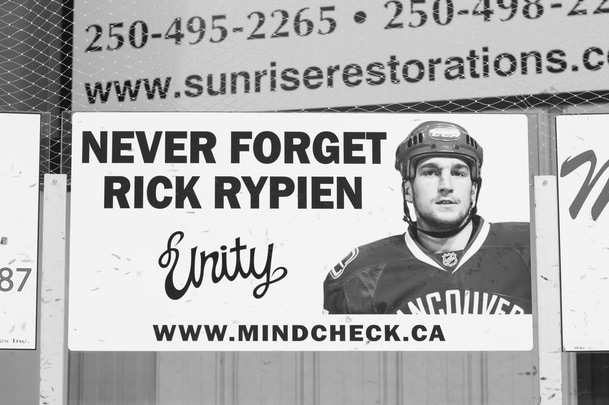 This article was originally posted February 15, 2015. It has been the most read post on this site so I am re-posting it in the hopes that it may help someone. Steve Montador, aged 35, died today. He was a well liked and respected professional hockey player. News articles are indicating a possible connection to his long battle with depression. During the pre-game skate at my weekly hockey game tonight, I noticed the sign above. Rick Rypien died on August 15, 2011. He was one of three NHL hockey players that summer to have their life cut short due in large part to depression. It is true that there is a strong link between concussions that many hockey players suffer and depression. Still, it got me thinking about how if such successful, talented, wealthy, physically strong men, in the prime of their lives can have such serious battles with depression, surely it can affect anyone. Experts claim that mental health issues affect at least 20% of people. The thing with depression is that it also affects the people you have relationships with. So a lot of you are dealing with the fallout of depression... Depression can be a completely debilitating disease with a potentially high mortality rate for people with severe depression or bi-polar disorder. Depression is the ultimate internal resistance system. It wages war on your hope. It steals your energy. It kills your motivation. It lies to you, telling you that you have nothing of value to offer other people. It saps your strength and positivity. It deceives you into over-estimating risk. It feeds your fears. It can confuse and disorient you, leaving you unsure about almost anything. It can also cause problems in your relationships, your work performance, and lead to substance abuse.
The good and bad news about depression is that, in most cases, it is treatable. That's good news because it means you don't have to be condemned to endless suffering. You may have to always fight it, but you can win. The bad news is that the depression can prevent you from seeking help. Unlike other diseases where you either seek treatment and get better, or accept your situation and devise ways of coping and moving on with your life, depression can cruelly prevent you from doing either. As contractors, we probably don't talk about our feelings very much. It's easy to distract ourselves by being productive. There are tangible problems to solve - deadlines, customers, projects, staff, paperwork, etc... Being busy and productive can help combat depression. On the flip side though - pressure, stress and anxiety can make dealing with depression extra challenging. If you are depressed, it will affect your business. I'm certainly not a psychologist. But I have personally struggled with depression in my life. It has also been ever-present in most of the key relationships my entire life. So I'm motivated to spend some time studying it. Here are a few things I've learned:
Here are some strategies for coping... 1. Lower your expectations of life, others and most importantly - yourself. - don't be a perfectionist - don't compare yourself to others - push back a little against western society's obsession with productivity - delegate; you don't have to do everything yourself - basically - give yourself a break! (you've likely earned it, so don't feel guilty) 2. Allow yourself to have a bad day. - You're not a robot. Ride out the lows. Start fresh tomorrow. 3. Take small positive actions. - If you can't cope with a stressful situation, take a 'mental health day' if you have to. Change the channel - go for a run. Have coffee with an old friend. Wash your truck. Organize that stack of paper work on your desk. Read something inspiring. Move things forward. Get a good night's sleep. 4. Avoid feeding the depression. - Avoid over-consuming junk food, alcohol and depressants. - Avoid negative people. - Avoid negative entertainment (in any form: video games, tv, music, etc) - Avoid exposing yourself to negative/stressful things you can't control (news, gossip, etc) 5. Express yourself. Creatively or physically. - Write, talk, play an instrument, sing, dance, paint, play a sport. 6. Consider your spiritual needs. - There is more to life than being a tiny, temporary cog in the big capitalist machine. Find your purpose. Find a way to help others. Express gratitude. 7. Recognize that negative emotions are preceded by negative thoughts. - Negative thoughts are usually distorted - false, exaggerated, inaccurate. - You can control your thoughts - choose to focus on positive things. - Develop a sense of appreciation and gratitude for the good things in your life. Express it. - Our thinking is influenced by what we take in through our senses. Is what we consume true? Is it positive? Are the people we associate with positive? 8. Exercise has proven to be an effective antidote to depression and anxiety, especially outside. Sunshine, fresh air, endorphins, movement are all great for reducing pain, stimulating your immune system, releasing stress, changing your state of mind, giving you energy, and breaking out of a state of emotional paralysis. 9. If you are suffering, reach out for help. Avoid isolating yourself. - This might be the hardest action for a depressed person to take. Help could take many forms. Medication to give you some relief and allow you to get your bearings so you can chart a course toward recovery. Talking to a friend. Talking to your doctor. Reading a book on depression. Here are some excellent resources worth checking out (click on the title): 5 REASONS TO STAY ALIVE by Matt Haig A short video with the highlights of his book. Please check this out if you are feeling suicidal. FEELING GOOD by David Burns Helps explain how our emotions work and how we can self manage them. Outlines the remarkable, scientifically proven simple techniques that will lift your spirits and help you develop a positive outlook on life. THRIVE - Finding Happiness The Blue Zones Way by Dan Buettner A very interesting scientific exploration of the happiest places on earth and what external factors have the greatest bearing on personal happiness. TEDTalk - The Surprising Science Of Happiness by Dan Gilbert Scientific research into what really makes a person happy. Truly enlightening and very interesting. Basically humans are terrible at predicting what will actually make them happy. Also shows how our minds can create happiness and contentment, regardless of how dire our circumstances. TEDTalk - What Makes A Good Life? by Robert Waldinger Results of the most comprehensive long term study on what really leads to happiness, health, meaning in life. Very interesting.
4 Comments
2/16/2015 00:12:36
Great topic choice. It's easy to get into a funk and then a funk turns into a year or two. I've seen it in people my whole life. I'm not affected by depression but sympathize for those who do.
Reply
Simon Kuhl
2/18/2015 12:20:31
Thanks for your viewpoint John. I know you'd go full-on Chuck Norris on depression if it ever tried to get its filthy mitts on ya.
Reply
Aaron Banks
2/21/2015 16:05:51
What a lot of people do not realize about depression is that it has an effect on your mind to want to feel sad or continue to be depressed. It is so hard to get up and just be happy.
Reply
12/27/2018 23:55:28
When we are dealing with a depressed person who is close to us, we should always be cautious on the words we say. As much as possible, we should never ask them a lot of questions. The good thing is we should always be there for them because what they need right now are people who can be there for them since they are experiencing darker days than usual. But we should always lift their spirits up, but it has to be a careful move, please always remember that!
Reply
Your comment will be posted after it is approved.
Leave a Reply. |
Categories
All
Archives
March 2021
|
